Inflammation
Inflammation is the body's natural response to harmful stimuli such as pathogens, damaged cells, or irritants. It is a crucial part of the body's immune response and plays a key role in the healing process.
Causes of Inflammation
- Infection: When the body is invaded by harmful pathogens such as bacteria, viruses, or fungi, it triggers an immune response leading to inflammation.
- Injury: Tissue damage caused by physical trauma or chemical irritants can also lead to inflammation.
- Autoimmune disorders: In conditions such as rheumatoid arthritis and lupus, the immune system mistakenly attacks healthy tissues, leading to chronic inflammation.
- Chronic diseases: Certain chronic diseases like obesity, diabetes, and heart disease can also trigger low-grade inflammation in the body.
Phases of Inflammation
Inflammation typically involves the following stages:
- Vasodilation and increased permeability: Blood vessels near the affected area widen, allowing more blood to flow and making the blood vessels more permeable, leading to swelling and redness.
- Migration of white blood cells: White blood cells, such as neutrophils and macrophages, migrate to the site of inflammation to engulf and destroy pathogens or damaged cells.
- Tissue repair: Once the harmful stimuli are neutralized, the body initiates the process of tissue repair and healing.
Symptoms of Inflammation
The classic signs of inflammation include:
- Redness: Due to increased blood flow to the affected area.
- Swelling: Caused by the accumulation of fluid and white blood cells.
- Heat: The warmth experienced at the site of inflammation due to increased blood flow.
- Pain: Nerve endings become more sensitive, leading to pain and discomfort.
- Loss of function: In severe cases, inflammation can lead to loss of function in the affected area.
Study Guide
To study inflammation effectively, consider the following key points:
- Understand the causes and triggers of inflammation, including infections, injuries, and autoimmune disorders.
- Learn the phases of inflammation: vasodilation, white blood cell migration, and tissue repair.
- Memorize the classic symptoms of inflammation: redness, swelling, heat, pain, and loss of function.
- Explore the role of inflammation in various diseases and conditions, such as arthritis, asthma, and inflammatory bowel disease.
- Understand the importance of inflammation in the body's immune response and the healing process.
Remember, inflammation is a normal and essential process for the body to protect and heal itself, but chronic inflammation can contribute to various diseases. Understanding its mechanisms and impact is crucial for a comprehensive study of this topic.
.◂Science Worksheets and Study Guides Third Grade. Hands-on Lab Skills/Science Inquiry - 3rd grade
Study Guide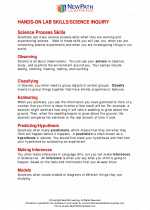 Hands-on Lab Skills/Science Inquiry - 3rd grade
Hands-on Lab Skills/Science Inquiry - 3rd grade  Worksheet/Answer key
Worksheet/Answer key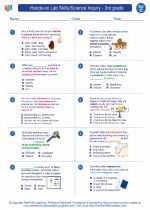 Hands-on Lab Skills/Science Inquiry - 3rd grade
Hands-on Lab Skills/Science Inquiry - 3rd grade  Worksheet/Answer key
Worksheet/Answer key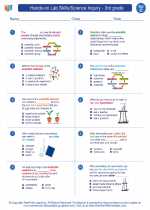 Hands-on Lab Skills/Science Inquiry - 3rd grade
Hands-on Lab Skills/Science Inquiry - 3rd grade  Worksheet/Answer key
Worksheet/Answer key Hands-on Lab Skills/Science Inquiry - 3rd grade
Hands-on Lab Skills/Science Inquiry - 3rd grade  Worksheet/Answer key
Worksheet/Answer key O-W-L
O-W-L  Vocabulary/Answer key
Vocabulary/Answer key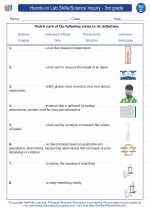 Hands-on Lab Skills/Science Inquiry - 3rd grade
Hands-on Lab Skills/Science Inquiry - 3rd grade  Vocabulary/Answer key
Vocabulary/Answer key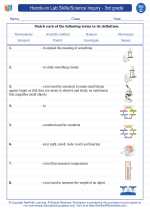 Hands-on Lab Skills/Science Inquiry - 3rd grade
Hands-on Lab Skills/Science Inquiry - 3rd grade 

 Worksheet/Answer key
Worksheet/Answer key
 Worksheet/Answer key
Worksheet/Answer key
 Worksheet/Answer key
Worksheet/Answer key
 Worksheet/Answer key
Worksheet/Answer key
 Vocabulary/Answer key
Vocabulary/Answer key
 Vocabulary/Answer key
Vocabulary/Answer key

The resources above cover the following skills:
Science as Inquiry and Process: A student should understand and be able to apply the processes and applications of scientific inquiry. A student who meets the content standard should:
Develop an understanding of the processes of science used to investigate problems, design and conduct repeatable scientific investigations, and defend scientific arguments.